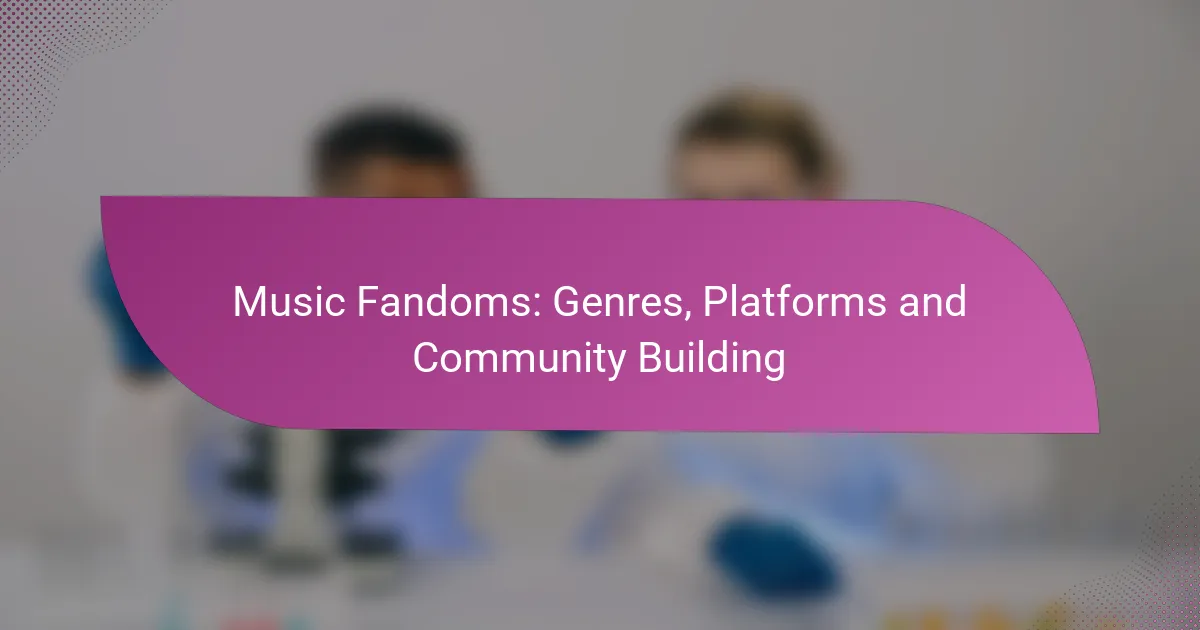Music fandoms are vital in shaping the landscape of genres by fostering engagement and building communities around specific styles. Through their collective enthusiasm, these dedicated groups can elevate lesser-known genres to mainstream visibility. Various platforms, including social media and streaming services, facilitate interaction and content sharing among fans, enhancing their connection to both each other and the artists they love. By creating spaces for meaningful engagement, fandoms can thrive and grow, enriching the overall music experience.
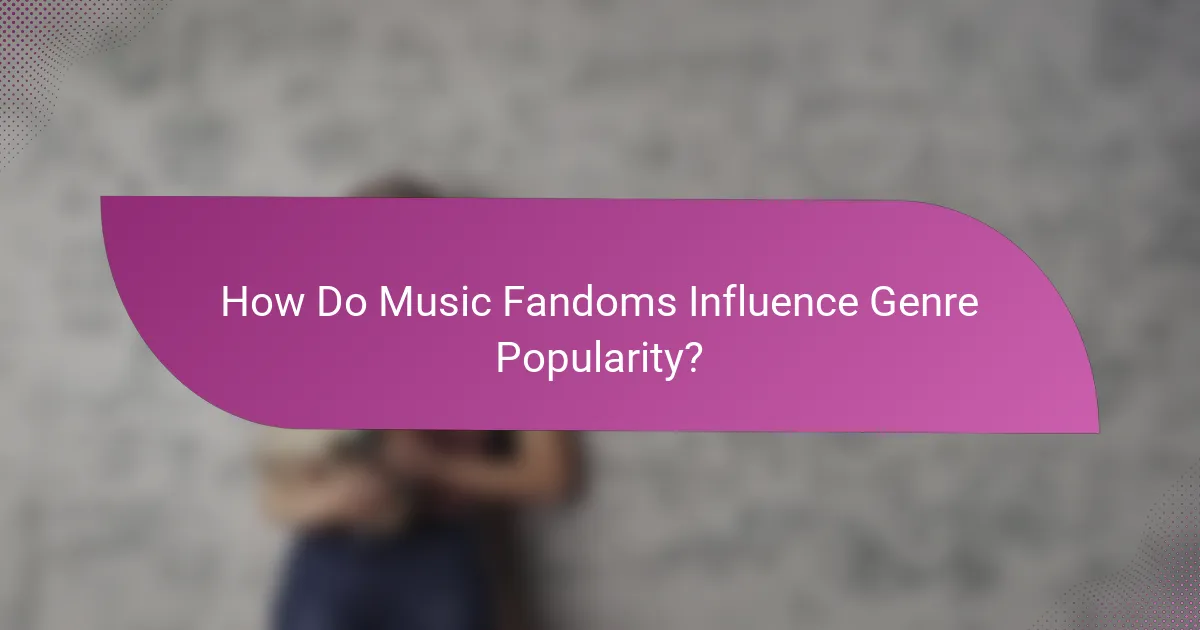
How Do Music Fandoms Influence Genre Popularity?
Music fandoms play a significant role in shaping genre popularity by driving engagement and creating communities around specific styles. These dedicated groups can elevate lesser-known genres to mainstream status through their collective enthusiasm and support.
Impact of fandoms on genre trends
Fandoms can significantly impact genre trends by promoting specific styles through social media, streaming platforms, and live events. When fans actively share their favorite music, they create a ripple effect that can lead to increased visibility and interest in particular genres.
For example, the rise of K-pop in Western markets is largely attributed to dedicated fandoms that utilize platforms like Twitter and TikTok to spread their music. This grassroots promotion can lead to chart-topping hits and increased sales.
Case studies of genre shifts
One notable case study is the resurgence of vinyl records, which has been fueled by a passionate community of collectors and enthusiasts. This fandom has not only revived interest in older genres like classic rock and jazz but has also influenced new artists to release their music on vinyl.
Another example is the rise of lo-fi hip hop, which gained popularity through online communities and streaming playlists. Fans of this genre have created a supportive environment that encourages artists to experiment and innovate, leading to a broader acceptance of diverse sounds.
Examples of genre fandoms
Fandoms can be found across various music genres, each with unique characteristics. For instance, the metal community is known for its strong sense of loyalty and support, often organizing festivals and events that celebrate their favorite bands.
Similarly, the indie music scene has a vibrant fandom that thrives on discovering and promoting underground artists. Platforms like Bandcamp allow fans to directly support musicians, fostering a close-knit community that values authenticity and creativity.
Lastly, the country music fandom often engages through fan clubs and social media groups, where members share concert experiences and promote their favorite artists, contributing to the genre’s sustained popularity.
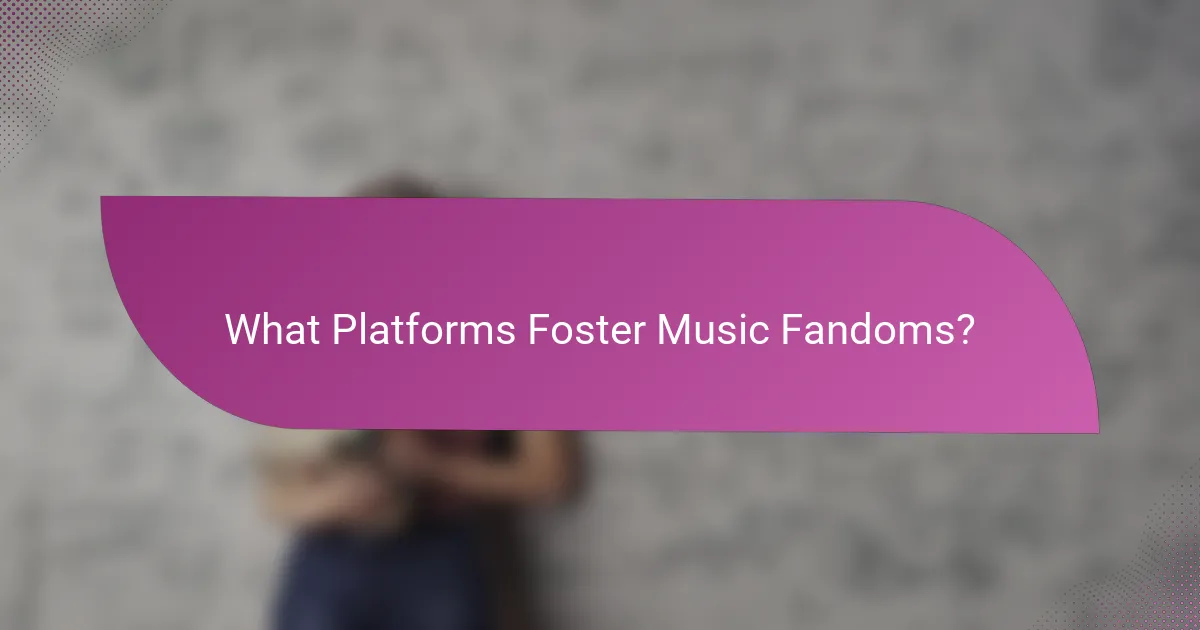
What Platforms Foster Music Fandoms?
Music fandoms thrive on various platforms that facilitate community interaction, content sharing, and engagement with artists. Key platforms include social media, streaming services, and dedicated fan forums, each offering unique features that cater to different aspects of music fandom.
Social media platforms
Social media platforms like Facebook, Twitter, and Instagram are essential for music fandoms, allowing fans to connect directly with artists and each other. These platforms enable real-time updates, sharing of content, and discussions about music, enhancing the sense of community.
Engagement strategies on social media can include following artists, participating in live Q&As, and joining fan groups. Fans should be mindful of platform algorithms that may limit visibility, so actively engaging with posts can help maintain connections.
Streaming services
Streaming services such as Spotify, Apple Music, and YouTube Music play a crucial role in music fandoms by providing access to vast libraries of music and exclusive content. These platforms often feature curated playlists, artist radio stations, and personalized recommendations that help fans discover new music.
Many streaming services offer social features, allowing users to share playlists or see what friends are listening to. Fans should explore these options to enhance their music experience and connect with others who share similar tastes.
Fan forums and websites
Fan forums and dedicated websites provide a space for deeper discussions about music, artists, and albums. Platforms like Reddit, dedicated fan sites, and Discord servers allow fans to share insights, theories, and experiences in a more focused environment.
When participating in these forums, fans should respect community guidelines and contribute positively to discussions. Engaging with fellow fans can lead to lasting friendships and a richer understanding of the music they love.

How to Build a Music Fandom Community?
Building a music fandom community involves creating a space where fans can connect, share, and engage with each other and their favorite artists. Focus on fostering relationships through interactive platforms, events, and meaningful content that resonates with the community’s interests.
Engagement strategies
Effective engagement strategies are essential for nurturing a music fandom community. Utilize social media platforms like Instagram, TikTok, and Twitter to create polls, Q&A sessions, and live streams that encourage participation. Regularly engage with fans by responding to comments and sharing user-generated content to strengthen connections.
Consider creating a dedicated online forum or Discord server where fans can discuss their favorite artists, share music recommendations, and collaborate on projects. This fosters a sense of belonging and encourages members to contribute actively.
Event organization
Organizing events is a powerful way to bring a music fandom community together. Start with virtual events such as listening parties or artist interviews, which can be easily accessed by fans worldwide. As the community grows, consider hosting in-person meetups, concerts, or fan conventions to deepen connections.
When planning events, ensure they cater to the interests of your community. Collaborate with local venues or online platforms to facilitate ticket sales and promotions. Offering exclusive merchandise or experiences can also enhance the appeal of your events.
Content creation
Content creation is vital for keeping a music fandom community engaged and informed. Develop a mix of content types, including articles, videos, and podcasts that explore artist interviews, album reviews, and music history. This variety keeps the community interested and encourages sharing.
Encourage community members to contribute their own content, such as fan art, covers, or blog posts. Highlighting their work not only builds a sense of ownership but also enriches the community’s overall content landscape. Establish clear guidelines for submissions to maintain quality and relevance.
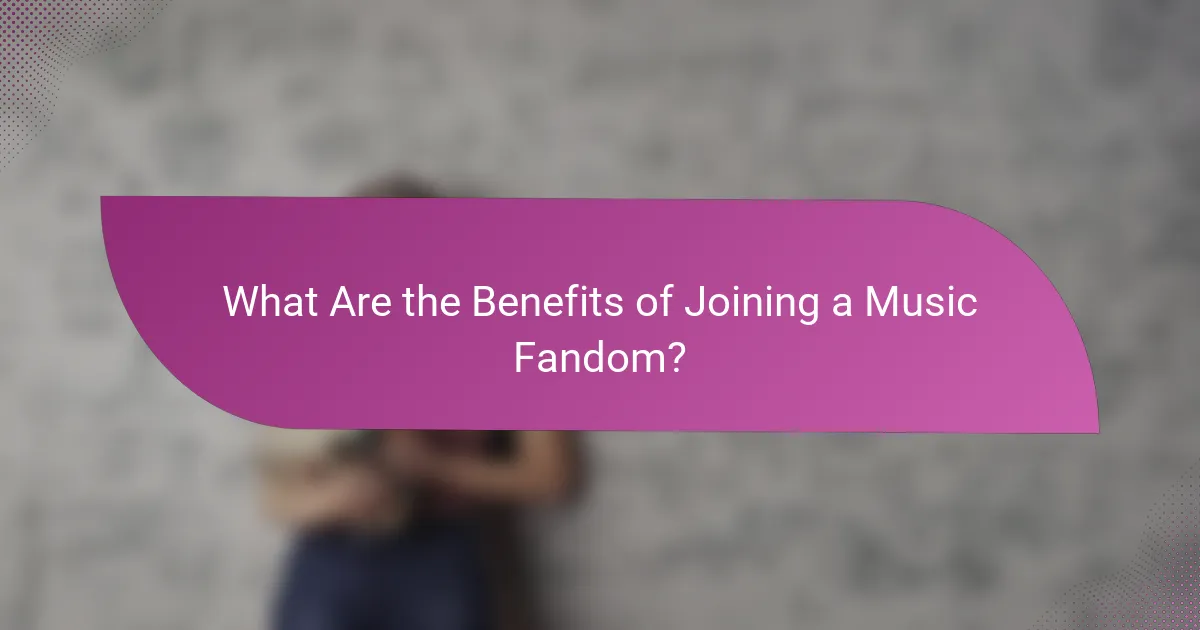
What Are the Benefits of Joining a Music Fandom?
Joining a music fandom offers fans a sense of belonging, connection, and access to unique experiences related to their favorite artists. These communities provide various benefits, including networking opportunities, exclusive content, and a platform to support the artists they love.
Networking opportunities
Being part of a music fandom allows fans to connect with like-minded individuals who share similar musical tastes. This can lead to friendships, collaborations, and even professional opportunities within the music industry. Fans often meet at concerts, online forums, or social media platforms, creating a rich tapestry of connections.
Additionally, networking within a fandom can provide insights into the music business, including event planning, promotion, and artist management. Engaging with fellow fans can also lead to organized meet-ups or fan events, enhancing the overall experience.
Access to exclusive content
Members of music fandoms frequently gain access to exclusive content that is not available to the general public. This can include early ticket sales, behind-the-scenes footage, unreleased tracks, and special merchandise. Such content often fosters a deeper connection between fans and their favorite artists.
Fandoms may also offer unique experiences like virtual meet-and-greets or Q&A sessions with artists, further enriching the fan experience. Staying active in the fandom can help fans stay informed about these exclusive opportunities.
Support for artists
Joining a music fandom enables fans to actively support their favorite artists in various ways. This support can manifest through purchasing albums, attending concerts, and promoting the artist on social media. Engaged fans help create a loyal fanbase that can significantly impact an artist’s career.
Moreover, fandoms often organize fundraising events or campaigns to assist artists in need, especially during challenging times. This collective effort not only strengthens the community but also demonstrates the power of fan support in the music industry.

How Do Different Genres Shape Fandom Dynamics?
Different music genres significantly influence how fans engage, interact, and build communities. Each genre fosters unique dynamics that affect everything from fan behavior to event participation and shared values.
Differences in engagement
Engagement levels can vary widely across genres. For instance, pop fans often engage through social media platforms, sharing content and participating in discussions, while metal fans may prefer in-person gatherings and forums dedicated to their niche interests.
Genres like hip-hop and electronic dance music (EDM) tend to have vibrant online communities, where fans actively create and share remixes or fan art. In contrast, classical music fans might engage more through concert attendance and discussions about composers and performances.
Genre-specific events
Events tailored to specific genres play a crucial role in fandom dynamics. For example, country music festivals often feature multiple artists and create a communal atmosphere, while punk rock shows might focus on smaller venues that encourage closer interactions among fans.
Additionally, genres like jazz may host jam sessions that invite audience participation, fostering a sense of belonging. Understanding the type of events associated with a genre can help fans find their community and deepen their engagement.
Community values
Each genre cultivates distinct community values that shape fan interactions. For example, the indie music scene often emphasizes authenticity and grassroots support, leading fans to prioritize independent artists and local shows.
In contrast, the K-pop fandom is known for its organized fan projects and collective efforts to support artists, showcasing a strong sense of loyalty and teamwork. Recognizing these values can enhance a fan’s experience and connection within their chosen genre.
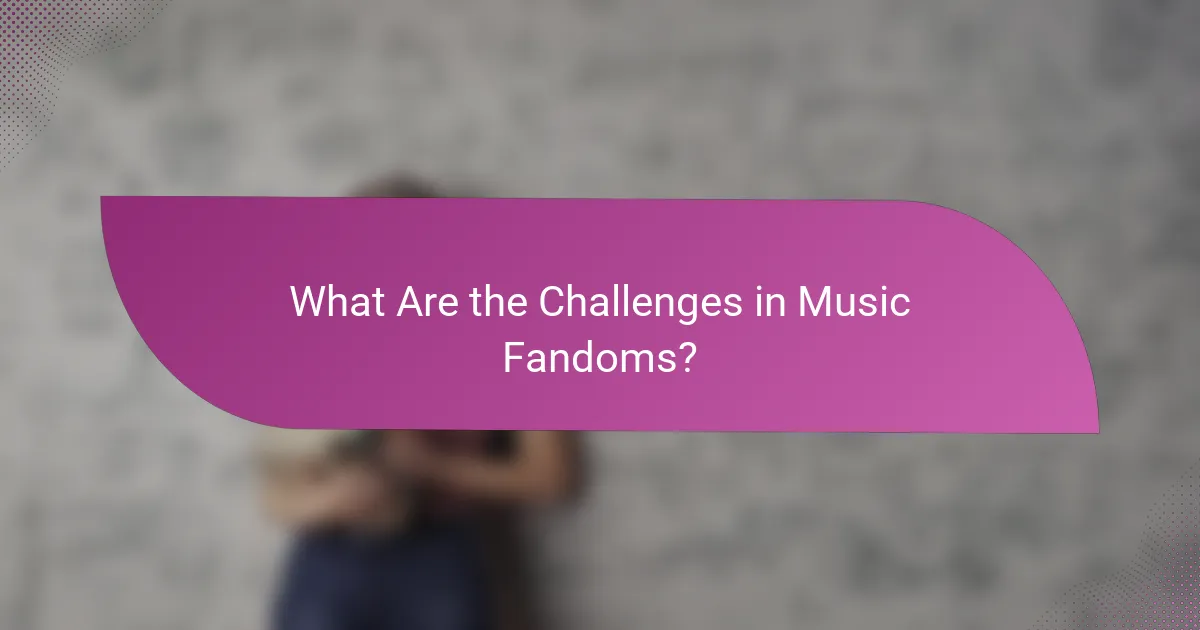
What Are the Challenges in Music Fandoms?
Music fandoms face several challenges, including internal conflicts, differing opinions on artists, and the impact of social media dynamics. These issues can affect community cohesion and the overall enjoyment of music.
Conflict within communities
Conflict within music fandoms often arises from differing tastes and opinions about artists or genres. Fans may have strong emotional attachments to their preferred music, leading to heated debates that can escalate into personal attacks.
To manage these conflicts, it’s crucial for community members to practice empathy and respect differing viewpoints. Establishing clear guidelines for discussions can help maintain a positive atmosphere and minimize disputes.
Encouraging open dialogue and promoting understanding can transform conflicts into opportunities for growth and learning. For instance, hosting moderated discussions or Q&A sessions can facilitate constructive conversations among fans.
